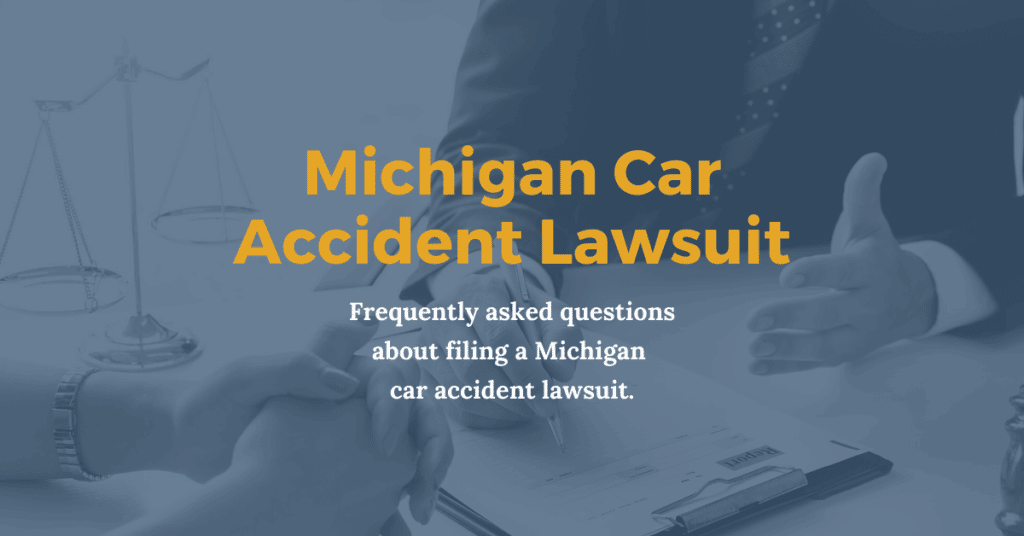Car Accident Lawsuit FAQs After A Michigan Crash

Probably the most frequently asked question that people have after they have been injured in a crash in Michigan is how they can file a car accident lawsuit. They want to know how they can sue a careless at-fault driver who has caused a crash that results in injuries, lost work, medical bills, and upended lives – permanently in many cases.
This makes perfect sense from both a justice – and a practical-oriented perspective. People who’ve been hurt due to another driver’s negligence want them held accountable for the harms and losses they have caused.
These losses include money for pain and suffering compensation, medical benefits (and medical bills), lost wages and other economic losses and damages they are legally entitled to and so they can move forward with their lives.
FAQs
How does a car accident lawsuit work in Michigan?
In Michigan, a car accident requires you to prove two important things. First, the other driver was at-fault, meaning he or she violated the traffic laws or was not reasonably careful. Second, you must show that your injuries have caused you to suffer an impairment that affected your ability to lead your normal life.
How do you prove fault?
You must be able to prove that the driver was 50% or more at-fault in causing the crash that injured you. If the other driver was less at-fault than that, then you will not be able to sue for pain and suffering and other compensation. Under Michigan’s comparative fault law, a crash victim who was “more than 50% at fault” cannot sue. (MCL 500.3135(2)(b))
Importantly, the comparative fault rules also provide that if you were at-fault in causing or contributing to your crash, then the amount of compensation you recover from your car accident lawsuit in Michigan will be reduced by the percentage of fault you were responsible for.
Once you prove that the other driver was at-fault in causing your crash, you must then be able to show that your crash-related injuries caused you to suffer a “serious impairment of body function.” (MCL 500.3135(1), (2), (3)(b)) This is called a tort-threshold and it is a legal standard that requires a crash victim to first prove that their injuries rise to this threshold level in order to sue for and collect pain and suffering compensation.
If you are suing for “excess” medical benefits (i.e., medical expenses in excess of the No-Fault PIP medical benefits coverage level in the policy through which you are claiming No-Fault insurance benefits) or “excess” lost wages or other economic damages, you do not need to prove a “serious impairment of body function.” The only exception to this is if you are a non-Michigan resident seeking economic damages. (MCL 500.3135(3)(d))
When should I file a car accident lawsuit in Michigan?
In Michigan, you should consider filing a car accident lawsuit if you were injured in a crash and the at-fault driver refuses to compensate you for your pain and suffering. You should also consider suing your auto insurance company if it refuses to pay your No-Fault benefits or delays payment.
How to file a lawsuit for a car accident in Michigan?
In Michigan, to file a lawsuit for a car accident, it is advisable to hire a lawyer who specializes in and has extensive experience handling these types of cases, has recovered verdicts and settlements in these cases, and who has reviews that show satisfied clients and expectations that were met.
Michigan’s laws for recovering pain and suffering compensation, excess medical benefits and lost wages and other economic damages in an automobile crash case can be very complex and confusing. They can also carry very harsh penalties for getting things wrong, such as a strict one-year deadline to file a first-party claim for incurred No-Fault insurance benefits.
When it comes to your case, you don’t want to get anything wrong. That’s why it’s crucial that you hire an experienced lawyer who knows the law.
Statute of limitations for a car accident lawsuit in Michigan
The time you have to file a car accident lawsuit in Michigan (statute of limitations) is 3 years after the crash if you are suing the at-fault driver for pain and suffering compensation and/or for vehicle damage. You only have 1 year after the crash to sue the auto insurance company for unpaid No-Fault benefits.
If you have filed an application for No-Fault benefits within one (1) year of your crash – which we strongly advise you do in order to protect your rights to medical benefits and lost wages – then you will have one (1) year after your most recent medical bill or wage loss “has been incurred” to sue for unpaid, overdue No-Fault benefits. (MCL 500.3145(2))
How long does a car accident lawsuit take in Michigan?
It’s difficult to answer how long a Michigan car accident lawsuit will take. It will depend on your injuries, the docket of where it is filed, whether you’re disabled from working and how long until you can return to your normal life; your lawyer’s track record and reputation; and the at-fault driver’s insurer.
Other relevant factors that influence how long it can takes include: whether your injuries will necessitate “excess” coverage for medical bills and lost wages; whether the at-fault driver is contesting liability; the liability insurance policy limits of the at-fault driver; whether there are multiple layers of insurance with different insurance companies; the defense lawyer or lawyers assigned to the case; whether the defendant is self-insured or has hired private counsel; the insurance company that insures the driver; whether the case is on a fast or slower discovery track which is determined by the judge assigned to the case; and how quickly the case can be scheduled for trial.
One of the factors that can significantly shorten the length of your case is the track record and reputation of your lawyer. Lawyers who have a proven track record of winning at trial and a reputation for being ready to go to trial will often be able to settle your case faster and for more money, compared to lawyers who an insurance company knows always take the last settlement offer and who the insurer knows has not taken a case to trial in years.
How much money to expect from a car accident lawsuit?
Every case is unique, so it’s difficult to say how much money you can expect from a car accident lawsuit in Michigan. But insurance industry research shows that cases will settle for 3 to 4 times as much when you have an experienced lawyer. Cases will settle faster and for more money.
The lawyers at Michigan Auto Law have more than 50 years of experience getting record-breaking automobile crash settlements and trial verdicts for our clients. In fact, we’ve recovered more million-dollar settlements on behalf of our clients than any other lawyer or law firm in Michigan.
To learn more about what the settlement value of your case may be, please check out our “Settlement Calculator.”
Who pays?
The at-fault driver’s auto insurance company is who pays in a car accident lawsuit in Michigan. However, if the pain and suffering compensation, excess medical and lost wages and other economic damages exceed the driver’s liability insurance coverage, then the driver may also have to pay.
Generally, the recovery amount in an automobile crash case is governed by the at-fault driver’s liability insurance coverage, meaning the insurance company – not the driver personally – pays to settle the case within the applicable insurance coverage limits available.
But if the recovery amount is more than what’s covered by the at-fault driver’s liability policy, then he or she may be held personally liable for that excess amount. When that happens, the at-fault driver may be required to pay what is owed to the person who was injured by the driver’s negligence.
How long after an automobile crash can I sue?
In Michigan, you have three years after an automobile crash to sue for pain and suffering compensation, excess medical benefits and excess economic loss and one year to sue for incurred No-Fault insurance benefits. Any case filed after these statutes of limitation will be dismissed.
What happens when someone dies in a crash?
When someone dies in a car accident in Michigan, the person’s family can bring a wrongful death claim seeking compensation for pain and suffering, loss of affection of their loved one and loss of financial support. A wrongful death case may have a modified statute of limitations depending on the facts.
Michigan’s wrongful death law allows the family of a person who was killed in a crash to bring a wrongful death claim. (MCL 600.2922(1) and (2)) Specifically, the Michigan law requires that this type of car accident lawsuit be brought in the deceased’s name and by the personal representative of the deceased’s estate.
If the crash victim passes away before the three-year statute of limitations has run – within 30 days of it having run – then the case “may be commenced by the personal representative of the deceased person at any time within 2 years after letters of authority are issued although the period of limitations has run.” (MCL 600.5852(1))
What happens if the driver who caused the crash doesn’t have insurance or has minimal coverage?
If the driver who caused the crash doesn’t have insurance or has minimal coverage, then your ability to recover the pain and suffering compensation, excess medical benefits and lost wages and other economic damages you’re entitled to may be limited by the driver’s personal assets and ability to pay.
A crash victim can still file a car accident lawsuit in Michigan against the at-fault driver. However, if the at-fault driver doesn’t have insurance or has very minimal insurance coverage, then the ability to collect what is owed to you can prove difficult. Some at-fault drivers will not have the personal resources to pay the compensation and damages that you are owed. Your lawyer can still file a judgment and garnish wages and periodically check on the financial status of the defendant at-fault driver, but you may not be able to recover for all the harms and losses you have incurred, or it may take much longer to collect money damages to fulfill a judgment.
Under these circumstances – where the at-fault driver is either uninsured or underinsured – your best and maybe your only chance for recovery is if you have “uninsured motorist” or “underinsured motorist” coverage.
Injured in an automobile crash and need a lawyer? Call Michigan Auto Law
If you have been injured in a crash and you want to know what your options are for filing a car accident lawsuit in Michigan, you can call toll free anytime 24/7 at (800) 968-1001 for a free consultation with one of our experienced attorneys. Contact us here to get help from an experienced attorney or you can use the chat feature on our website.






